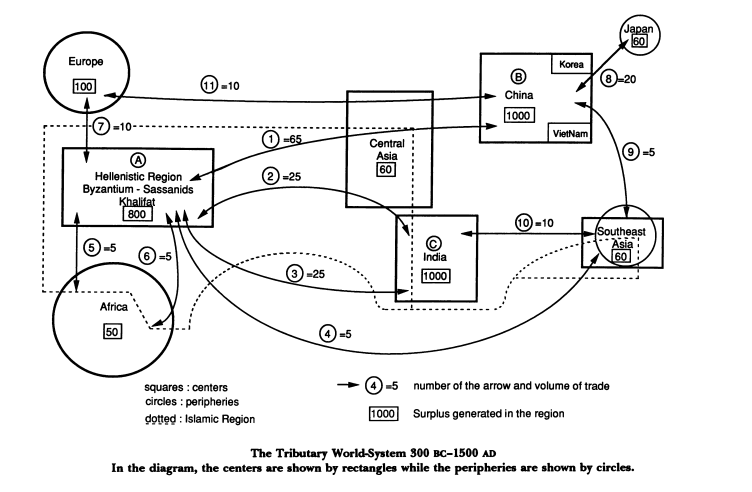
We’ll start by ditching the anachronistic “Victorian Marxists’” theory of development of human history (which tended to map the pattern of historical development of Europe onto the whole world) in favor of the modern Marxist World-System theory.
Therefore, the modern World-System is a capitalist World-System, the roots of which go back to the beginnings of the 16th century. Previous – pre-capitalist – systems were only regional. The more advanced among them are called “tributary” (Amin), which refers to the systems of 300 BC – 1500 CE. What they have in common is that they extracted the surplus through peasant activities through transparent mechanisms in connection with the organization of the power hierarchy, which was reproduced (and legitimized) strictly by the dominance of ideology (state religion). Therefore, there the government was the source of wealth, while in capitalism the opposite is the rule.
The general capitalist market provides a framework in which economic laws (competition) act as forces independent of subjective will. No pre-modern society was based on such principles. Those did contain elements of proto-capitalism, but they succumbed to the prevailing tributary logic. Within and among them exchanges of every kind were intense and served as a means of significant redistribution of surpluses. However, the eventual “centralization” of the surplus was essentially linked to the centralization of political power, and this never crossed local, state or regional borders (except in two shorter periods: the Macedonian and Roman expansions, neither of which gave rise to mechanisms of continuous reproduction).
On the other hand, they gradually crystallized the preliminary elements of the capitalist mode of production; affirmation of modern forms of private property, protection of these forms by law and significant expansion of wage labor (in agriculture and crafts).
So, as shown in the illustration, multipolarity was inherent to pre-capitalist relations of production. The disruption of multipolarity was conceived by the colonization of the Americas and the slave trade, which greatly accelerated the expansion of the proto-capitalist elements mentioned above. Mercantile society, with the accelerated development of production forces, over time imposed the “factory” as the main form of production, a system based on the minimization of production costs in order to maximize profits, giving priority to the endless accumulation of capital (Wallerstein) and non-interfering forms of government.
The vertical expropriation of the surplus (which transformed the aristocracy-peasant polarization into the bourgeoisie-proletariat) gradually lost its primacy over the horizontal one (which, by universalizing the law of value, established the center-periphery antinomy) due to the need to extend the reach of the system to ensure a reduction in costs, thereby peripheral regions historically developed as complementary to the central ones. Capital’s search for unpaid costs and the organized allocation of elements of the production process according to the cheapest labor force are the basic elements of the global transfer of value (Heinrichs), and without global transfers of surplus there can be no world capitalism (Frank).
Therefore, we can define the capitalist world-system as a hierarchy of the center-periphery complexes through which the surplus is drawn from the periphery to the center, which makes it not homogenizing but polarizing (Cleland). Accordingly, imperialism is not a phase of capitalism (nor its highest stage), but capitalism was imperialistic and inherently polarizing from its inception. So, can capitalism be multipolar? If we allude to a more permanent version of multipolarity, the answer is definitely negative. Multipolarity within capitalism is possible only temporarily, during the process of restructuring the world economy, until the new division of cards is completed (the First and Second World Wars are the most recent examples).
Imagine the situation where we had several capitalist centers that simultaneously extracted value from the periphery – they would need at least one more planet. In reality, in order to form a new – parallel – center (like the East-West bipolarity in the 20th century), it is absolutely necessary that the other pole exists outside the capitalist world-system, that is, in socialism. Precisely such conclusions are imposed on Russia today, which, due to the necessity of economic efficiency under sanctions and military pressure of imperialism, has no alternative to the application of at least some socialist policies and a more internationalist approach to international relations than it practiced in previous decades.
However, as our perspective is always the perspective of the most oppressed social strata, whether in a national (proletariat) or world framework (Global South), every struggle for restructuring the World-System is our chance for further revolutionary advances. The struggle for the establishment of new capitalist metropolises also requires political means to disrupt that complementarity, which meant submission to the hegemonic capitalist power (Aglietta). The Bolshevik revolution, national liberation and unification of the Southern Slavs, the rise of anti-colonial struggles, etc. are just some of the examples of using these contradictions, and there is no doubt that for now West Africa and the progressive countries of Latin America use the given advantage most effectively.
Missing a chance for an alliance with a block of countries challenging the global hierarchy would mean remaining stuck in the current – complementary – role in each of the combinations of the future world order.
Abdelraheem Kheirawi






